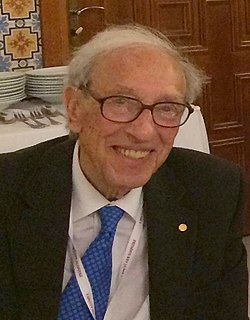A Quote by Edmond H. Fischer
I thought I would reflect here on a theme most scientists enjoy recalling: the part luck played in their accomplishments.
Related Quotes
Scientists are entitled to be proud of their accomplishments, and what accomplishments can they call 'theirs' except the things they have done or thought of first? People who criticize scientists for wanting to enjoy the satisfaction of intellectual ownership are confusing possessiveness with pride of possession. Meanness, secretiveness and, sharp practice are as much despised by scientists as by other decent people in the world of ordinary everyday affairs; nor, in my experience, is generosity less common among them, or less highly esteemed.
He wanted us to play whatever we played in the most characteristic and appropriate style. Even it was the theme from 'The Godfather,' you needed to play that then the way that a Hollywood producer would expect it to be played. Whether it was that or the posthorn solo from Mahler's Symphony No. 3, he would expect that to be played in the way that Leonard Bernstein wanted to hear it. In retrospect, I think it was a sensational way to teach this particular group of students. By the time you graduated you could absolutely read anything with any trumpet.
The first thing I think I ever played in public, aside from singing in church, would have been - and this is a true story - when I was about nine or 10 years old, I was obsessed with Twin Peaks. I played the theme from Twin Peaks on a little tiny Casio keyboard. People politely applauded. I just fell in love with that song and thought it was very heartbreaking.
I've always thought that each album would be my last one, and then I would be out of ideas and I would move to photography or something. I thought it was transient and it's not because of this entrenched career stubbornness that I've done it for so long, it's just something I enjoy doing, and it's the most direct way I can express something.
Part of the appeal was that Medawar was not only a Nobel Laureate, but he seemed like a Nobel Laureate; he was everything one thought a Nobel Laureate ought to be. If you have ever wondered why scientists like Popper, try Medawar's exposition. Actually most Popperian scientists have probably never tried reading anything but Medawar's exposition.
Before Kuhn, most scientists followed the place-a-stone-in-the-bright-temple-of-knowledge tradition, and would have told you that they hoped, above all, to lay many of the bricks, perhaps even the keystone, of truth's temple. Now most scientists of vision hope to foment revolution. We are, therefore, awash in revolutions, most self-proclaimed.
You can say that all you want, but even in the little time that I've been in this industry, I've learned that it isn't exactly what you expect, so you've got to have a level head. I thought people would dig it. I thought people would enjoy it. It's AMC. I thought people would be fans. But, I did not think we would be the best new show on television.



































